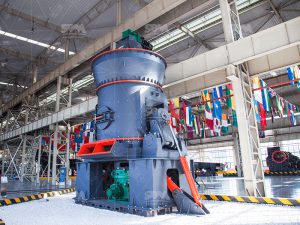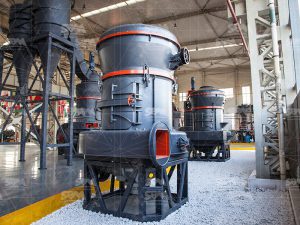Petroleum coke, also known as petcoke, is a carbon-rich material derived from the oil refining process. It has become increasingly important as an industrial fuel and in various manufacturing processes. However, to maximize its potential, petcoke must be finely ground to increase surface area, enhance combustion, and meet the requirements of different applications. In this article, we will explore how petroleum coke is processed through grinding mills, focusing on the best grinding technologies to achieve specific results.
Petroleum coke is produced as a byproduct during the refining of crude oil. It is primarily composed of carbon, with minor amounts of sulfur, metals, and volatile compounds, depending on the type of crude oil and the refining process. Its high carbon content makes petcoke an excellent energy source for various industrial applications. Typically, petroleum coke is categorized into two types:
Green petroleum coke: This is the unprocessed raw form of coke, characterized by a higher sulfur content and residual hydrocarbons.
Calcined petroleum coke: After undergoing a high-temperature calcining process, green coke is converted into calcined petroleum coke. This form is purer and finds more specialized industrial applications.
Because petcoke is usually hard and brittle, it needs to be finely ground for optimal use. This grinding process requires specialized mills designed to handle the material’s hardness and achieve the desired fineness.
Petroleum coke has a wide range of applications, which have evolved over time due to its low cost and high energy content. Some of the most significant applications include:
Fuel for cement kilns and power plants: Petcoke serves as an alternative to coal in cement kilns and thermal power plants due to its high calorific value. However, petcoke’s high sulfur content necessitates careful handling and environmental control.
Aluminum industry: Calcined petroleum coke is used as a carbon anode in aluminum smelting. The finely ground calcined petcoke plays a vital role in the electrolysis process, where it functions as a conductor of electricity.
Steel industry: Petcoke is used as a recarburizer in the steel industry, where it adds carbon to the molten steel, ensuring the desired carbon content in the final product.
Graphite manufacturing: Petcoke, particularly calcined, is used as a raw material for producing graphite, which is essential in a range of industries such as electronics, automotive, and aerospace.
Given these applications, the importance of precision in grinding petroleum coke cannot be overstated. Proper grinding enhances the performance and usability of the material in its final application, ensuring consistency, energy efficiency, and environmental compliance.
Processing petroleum coke into fine powder is a multi-stage operation that requires selecting the appropriate mill technology and optimizing the grinding process. Here, we will focus on the key steps involved in petcoke grinding and highlight the best mill technologies for this process.
Before grinding, petroleum coke is often crushed into smaller pieces, usually ranging from 50mm to 70mm. This pre-processing step is critical for mills that are designed to handle a specific input size. Depending on the material’s moisture content, pre-drying may also be necessary to ensure efficient grinding.
The grinding of petroleum coke into fine powder involves choosing the appropriate grinding mill based on the specific application, particle size requirements, and the properties of the petcoke. Below are some of the most effective grinding mills used in the petcoke processing industry:
MTW European Trapezium Mill: This is a high-efficiency mill that integrates the functions of grinding, powder selection, and drying. It is suitable for grinding petcoke into fine powder with a typical output size of 80-425 mesh. The MTW mill is equipped with advanced technology to handle the hard and abrasive nature of petroleum coke.
SCM Ultrafine Mill: Designed for producing ultra-fine powders with fineness ranging from 325 to 3250 mesh, the SCM mill is an ideal solution for processing petcoke when extremely fine particles are required. Its low energy consumption and advanced dust control system make it suitable for applications that demand environmental compliance.
LM Vertical Mill: This mill is perfect for petcoke grinding in industries like cement, power plants, and smelting. It can grind materials from 0-70mm in size and produces a final particle size ranging from 0.08mm to 2mm. The LM Vertical Mill’s integrated drying, grinding, and powder selection system ensures energy efficiency and precise control of the product’s fineness.
MRN Pendulum Roller Mill: This mill is suited for grinding petcoke with a finished particle size of 30-325 mesh. It is particularly useful in applications where both fine and coarse petcoke powder are needed. The MRN mill’s energy-saving design reduces operational costs, making it an attractive option for large-scale operations.
Once petcoke is ground into fine powder, it undergoes further processing depending on its intended use. For example, in cement plants, the powdered petcoke is stored in silos and fed into kilns as fuel. In the aluminum industry, calcined petcoke is blended with other materials before being formed into anodes for smelting.
Grinding petroleum coke can present environmental challenges, especially due to its high sulfur content. Efficient dust collection systems, such as those integrated into modern grinding mills, are essential to minimize the emission of particulate matter into the atmosphere. Additionally, sulfur dioxide (SO2) emissions from burning petcoke must be controlled through flue gas desulfurization systems to comply with environmental regulations.
Fineness control is critical for ensuring that the petroleum coke powder meets the requirements of different applications. Generally, finer particles have a higher surface area, which improves combustion efficiency and reactivity in processes like calcination and smelting. Most modern grinding mills are equipped with dynamic classifiers or other fine-tuning mechanisms that allow precise control over the particle size distribution.
The energy-intensive nature of grinding petroleum coke necessitates careful selection of mills with high energy efficiency. Vertical mills, such as the LM Vertical Mill, have become increasingly popular due to their ability to integrate multiple functions (grinding, drying, and classification) within a single system, reducing energy consumption and improving overall process efficiency.
Petroleum coke grinding is a complex process that requires selecting the right mill technology to meet specific application needs. From producing fuel-grade petcoke for cement kilns to supplying ultra-fine calcined coke powder for aluminum smelting, the grinding stage is essential in unlocking the full potential of this versatile material. By using advanced grinding mills like the MTW European Trapezium Mill, SCM Ultrafine Mill, and LM Vertical Mill, industries can achieve the precise control over particle size distribution, energy efficiency, and environmental compliance needed to make the most of petroleum coke in a range of applications.
Understanding the intricacies of petcoke grinding and the available technologies will empower industries to improve their operational efficiency, reduce costs, and meet the growing demand for high-quality petroleum coke powder.

Based on the absorption of advanced technologies of famous international corporations and 30 years’ experience in grinding mill production, SBM has launched the LM Vertical Grinding Mill which integrates five functions of crushing, grinding, powder selection, drying and material conveying. It is characterized by centralized technological process, small occupational area, low investment, high efficiency, energy conservation and environment protection.

MTW European Grinding Mill is innovatively designed through deep research on grinding mills and development experience. It absorbs the latest European powder grinding technology and concept, and combines the suggestions of 9158 customers on grinding mills. This grinding mill perfectly satisfies the production demands of the customers on 200-33μm (80-425Mesh) fine powder.